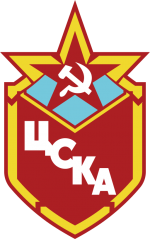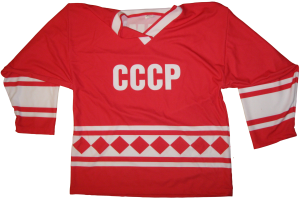Soviet National Team
 Soviet Union Hockey Logo (Red Army) |
| Most games |
|---|
| Alexander Maltsev (321) |
| Most goals |
| Alexander Maltsev (213) |
| Most points |
| Sergei Makarov (248) |
| First game |
(East Berlin, East Germany; 22 April 1951) |
| Last game |
(Frankfurt, Germany; 11 October 1991) |
| Largest victory |
(Colorado Springs, United States; 26 December 1967) |
| Largest defeat |
(Ottawa, Canada; 9 January 1968)
|
| Canada Cup |
| Winners: 1 – 1981 |
| World Championships |
| Gold medalists: 22 – 1954, 1956, 1963, 1964, 1965, 1966, 1967, 1968, 1969, 1970, 1971, 1973, 1974, 1975, 1978, 1979, 1981, 1982, 1983, 1986, 1989, 1990 |
| International competition |
| Current record: (W-L-T) 738–110–65 |
| Medal record | ||
|---|---|---|
| Olympic Games | ||
| 1956 | Ice hockey | |
| 1960 | Ice hockey | |
| 1964 | Ice hockey | |
| 1968 | Ice hockey | |
| 1972 | Ice hockey | |
| 1976 | Ice hockey | |
| 1980 | Ice hockey | |
| 1984 | Ice hockey | |
| 1988 | Ice hockey | |
The Soviet national ice hockey team was the national ice hockey team of the Soviet Union. The team won nearly every world championship and Olympic tournament between 1954 and 1991 and never failed to medal in any International Ice Hockey Federation (IIHF) tournament they competed in.
After 1991, the Soviet team competed as the Unified Team at the 1992 Winter Olympics and as the Commonwealth of Independent States at the 1992 World Championship. In 1993, it was replaced by national teams for Belarus, Estonia, Kazakhstan, Latvia, Lithuania, Russia and Ukraine. The IIHF recognized the Russian ice hockey federation as the successor to the Soviet Union hockey federation and passed its ranking on to Russia. The other national hockey teams were considered new and sent to compete in Pool C.
The IIHF Team of the Century included four Soviet-Russian players out of a team of six. Goalie Vladislav Tretiak, defenseman Vyacheslav Fetisov and forwards Valeri Kharlamov and Sergei Makarov who played for the Soviet teams in the 1970s and the 1980s were voted on to the IIHF Centennial All-Star Team in a poll conducted by a group of 56 experts from 16 countries.[1]
History
Ice hockey was not properly introduced into the Soviet Union until the 1940s, though bandy, a similar game played on a larger ice field, had long been popular in the country. It was during a tour of FC Dynamo Moscow of the United Kingdom in 1945 that Soviet officials first got the idea of establishing an ice hockey program. They watched several exhibition matches in London, and National Hockey League President Clarence Campbell would later say that "This was the time when the Russians got the idea for their hockey team. The Russian soccer players were more interested in watching Canadian players play hockey than in soccer." The Soviet Championship League was established in 1946, and the national team was formed shortly after, playing their first matches in a series of exhibitions against LTC Praha in 1948.
The Soviets planned to send a team to the 1953 World Championships, but due to an injury to Vsevolod Bobrov, one of their star players, officials decided against going. They would make their debut at the 1954 World Championships instead. Largely unknown to the larger hockey world, the team surprised many by winning the gold medal.
Throughout the rest of the 1950s the World Championships were largely contested between Canada and the Soviet Union. That changed in the early 1960s. Canada won the gold in 1961, and after missing the 1962 tournament due to political issues, the Soviets would win the gold medal every year until 1972.[6] They faced perhaps their greatest upset at the 1976 World Championships; in their opening match against host Poland, the Soviets were defeated 6–4.
In 1972 the Soviets played Canada in an exhibition series that saw the Soviet national team play a team composed of National Hockey League (NHL) players for the first time. Both the Olympics and World Championships did not allow professionals, so the best Canadian players were never able to compete against the Soviets, and in protest at this Canada had left international hockey in 1970. This series, known as the Summit Series, was a chance to see how the NHL players would fare. In eight games (four in Canada, four in the USSR), the teams were close, and it took until the final 34 seconds of the eighth game for Canada to win the series, four games to three, with one tie.
At the 1980 Winter Olympics, the Soviets also had one of their most notable losses. Playing the United States in the medal round, the Soviets lost 4–3. This match, later dubbed the Miracle on Ice, was notable because it had the Soviets, recognized as the top international team in the world, against an American team composed largely of university-level players. The Americans would go on to win the gold medal in the tournament, while the Soviets finished with the silver, only the second time they failed to win gold at the Olympics since their debut in 1956.
The reforms of the 1980s in the Soviet Union had a detrimental effect on the national team. No longer afraid to speak out against their treatment, players like Viacheslav Fetisov and Igor Larionov openly critiqued the management style of their coach, Viktor Tikhonov, which included being secluded in a military-style barracks for eleven months of the year. They also sought the chance to move to North America and play in the NHL, though the authorities were reluctant to allow this. Negotiations with the NHL began in the late 1980s over this, and in 1989 several players, including both Fetisov and Larionov, were permitted to leave the Soviet Union and join NHL teams.
Yuri Korolev was head of the research group for the national men's team from 1964 to 1992, and contributed to the team winning seventeen Ice Hockey World Championships and seven Winter Olympic Games gold medals.
Soviet journalist Vsevolod Kukushkin traveled with the national team as both a reporter and an English to Russian translator. He had access to the team's locker room and the opportunity to speak directly with the players and be part of their daily life.[12] In his 2016 book The Red Machine, Kukushkin reported that the nickname for the Soviet national team came into usage during the 1983 Super Series, when a headline in a Minneapolis newspaper headline read "The Red Machine rolled down on us".
Controversy
Until 1977, professional players were not able to participate in the World Championship, and it was not until 1988 that they could play in the Winter Olympics. However, the Soviet team was populated with amateur players who were primarily full-time athletes hired as regular workers of a company (aircraft industry, food workers, tractor industry) or organization (KGB, Red Army, Soviet Air Force) that sponsored what would be presented as an after-hours social sports society hockey team for their workers in order to keep their amateur status. By the 1970s, several national hockey federations, such as Canada, protested their use of the amateur status for players of Eastern Bloc teams and even withdrew from the 1972 and 1976 Winter Games
Stats
Leading scorers (Olympics, World Championships, Canada Cups, 1972 Summit Series)
- Sergei Makarov – 248 points
- Aleksandr Maltsev – 213+ points
- Valeri Kharlamov – 199 points
- Boris Mikhailov – 180 points
- Vladimir Petrov – 176 points
Note: The team's Olympic record was 62–6–2 (win-loss-tie) through 1956–1992. They scored 467 goals and gave up 127 goals. That averaged 6.67 goals per game and 1.81 goals given up.
Note: Maltsev has at least 213 points from his goals, and possibly more, but an accurate number for his assists cannot be found.
World Championship record
Summit Series record
- 1972 – Lost to Canada (against Canadian NHL players)
- 1974 – Won series against Canada (against Canadian WHA players)
Canada Cup record and World Cup of Hockey record
- 1976 – Finished in 3rd place
- 1981 – Won championship
- 1984 – Lost semifinal
- 1987 – Lost final
- 1991 – Finished in 5th place
Challenge Cup and Rendez-vous vs. NHL All-Stars
References
External links
- Hockey CCCP International
- 1972 Summit Series.com
- Canada Versus the Soviet Union (1972–1987)
- The Hockey Almanac
